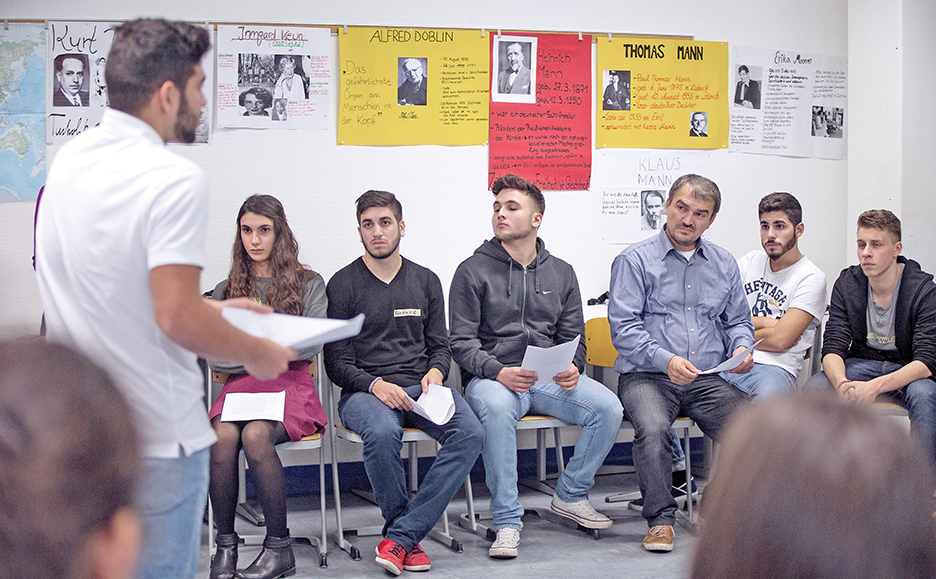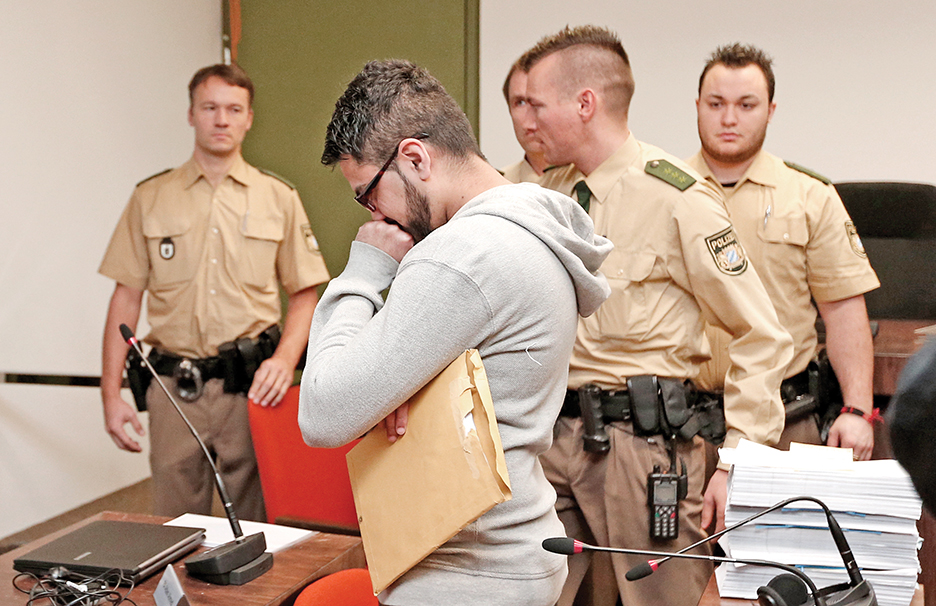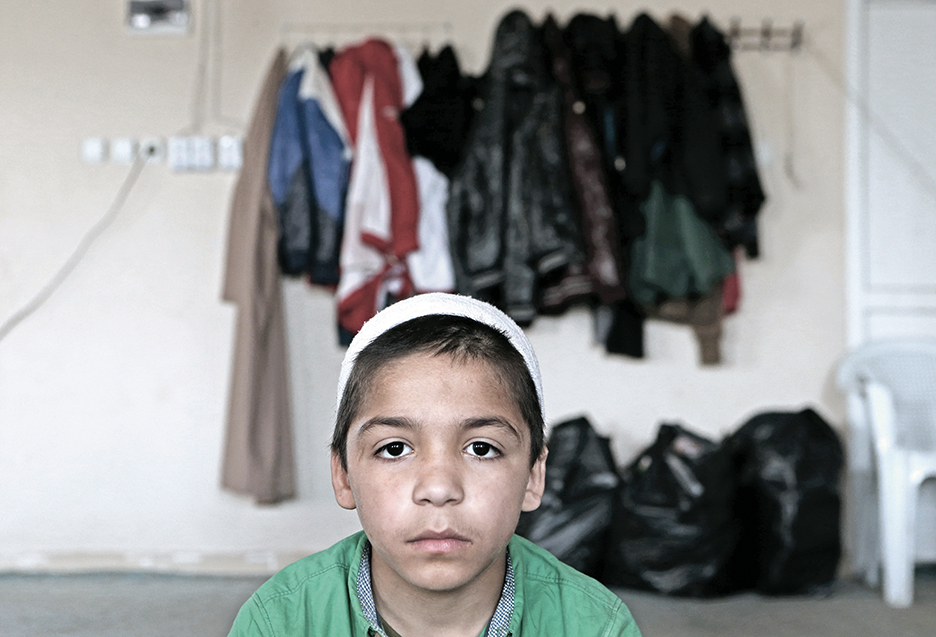Germany’s HAYAT counseling service shares its experience with deradicalization
By Julia Berczyk, HAYAT-Germany
The phenomenon of people traveling to participate in foreign conflicts is by no means new or intrinsically tied to the Islamic State (IS) or other violent jihadist networks. David Malet reflects upon how local insurgencies — the conflicts often portrayed as threats to the transnational community — mobilize international networks in his analysis of historical foreign fighter insurgencies, Foreign Fighters: Transnational Identity in Civil Conflicts. Malet argues that throughout modern history, there have been strong similarities in recruitment strategies for distant wars that are independent of respective conflict type. International combatants have fought for various causes, ranging from international communism to local ethnic group interests. Yet, law enforcement agencies all over the world increasingly focus on foreign fighters traveling to Syria and Iraq because of a considerable increase in their number, as well as the perceived threat they pose upon their return. The German government estimates that about 700 German residents and citizens have traveled to the region to support jihadist groups such as IS.
But how do we prevent individuals from traveling abroad, and how do we respond to those who return, apart from engaging law enforcement, increased security regulations and other repressive measures? This article reflects upon the work and experiences of the counseling service HAYAT-Germany and emphasizes the indispensable role of nonstate actors, integrative measures and professional networks to counter the perceived threat posed by returning foreign fighters.

Family Counseling and Deradicalization
HAYAT, which means “life” in Turkish and Arabic, is the first German counseling program for individuals, as well as relatives and friends of people involved in radical Islamist groups or on the path to violent jihadist radicalization, including those who travel to Syria, Iraq and other war zones.
HAYAT was established in 2011, tying in with the experiences of the first German deradicalization and disengagement program for highly radicalized neo-Nazis: EXIT-Germany. EXIT developed methods and approaches to work with the relatives of radicalized persons to eventually prevent, decelerate and invert the radicalization process. Transferring this unique knowledge and experience into the realm of Islamic extremism, HAYAT is now available to parents, siblings, friends, teachers, employers and anyone who has a relationship with a person potentially on the path to [violent] radicalization. Moreover, HAYAT is working directly with radicalized people to demonstrate the prerequisites and possibilities of desistance from radical behavior, ideologies and groups.
Since January 2012, HAYAT has also partnered with the German Federal Office for Immigration and Refugee Affairs (Bundesamt für Migration und Flüchtlinge, BAMF), which established a national advisory center on radicalization (Beratungsstelle Radikalisierung). This hotline takes calls from relatives and other concerned persons, provides an initial assessment and then redirects calls to local, non-governmental partners like HAYAT.
During this first contact, HAYAT experts conduct an analysis and risk assessment of the respective situation to determine the level of counseling needed and to answer the most important questions first: Is the person in question in danger of becoming violently radicalized? Or is it a harmless case of conversion to Islam? Once the counselor has gained a clear picture of the situation, an individual counseling process and step-by-step plan is designed, including various measures to prevent further radicalization or to stop and reverse the process.
With our experience and expertise, HAYAT guides people who don’t want to lose their radicalized relative or friend and hope to understand and win him/her back. In short, we:
- counsel, provide contacts and listen
- make clear distinctions between a strong, lived faith and an ideology of inequality that can result in violence and terrorism
- help identify alarming signs and show the limits of what is possible
- provide new perspectives and shepherd cases for as long as necessary
Many parents turn to HAYAT for advice, among other things, in case their children are about to travel abroad to places like Syria, have already departed or may even have returned home. At HAYAT, we pursue three main goals in these cases:
- Try everything possible to dissuade them from traveling abroad.
- If they are already abroad, try to stop them from engaging in combat and persuade them return.
- Help them return and integrate into a safe social environment that respects universal human rights.
HAYAT relies on a nationwide network of partners and considers itself a bridge between families and institutions such as schools, social service agencies and, if applicable, courts, police or places of work. With this network, HAYAT assists in communicating with various parties with the primary goal of catering to the specific needs of the person and his family.
The demand for counseling has increased at HAYAT due in part to the emergence of IS. As of June 2015, HAYAT has provided assistance in 156 cases, of which 106 are still active. There is an increased security relevance in 48 cases. Among these, 38 relate to the conflict in Syria/Iraq. Four out of these 38 cases deal with returnees from the conflict in Syria/Iraq, and the HAYAT team is also aware of other returnee cases that are not directly linked to the program.

The Returnees
People join jihadist groups for different reasons. Grievances, lack of recognition and appreciation, struggles within the family, the search for higher meaning in life, the fight for justice, and experiences of discrimination and exclusion are only some of many contributing factors that are exploited by violent ideologies. Our experience at HAYAT indicates that independent of social, national or religious background, any family in Germany can be affected.
Just as people joined these militant groups for different reasons, they also leave them for different reasons. By May 2015, about 230 foreign fighters had returned to Germany, according to the Verfassungsschutz, Germany’s domestic security agency. Contrary to public perceptions and statements by security services, not every returnee is dangerous, per se, will conduct a terrorist attack or motivate others to do. Moreover, not every returnee has been involved in violence, is brutalized or represents an imminent threat to society. In fact, the Verfassungsschutz notes that a majority of returnees seem to have engaged in no combat.
Based on our practical experience (as well as that of other experts in the field, such as Peter Neumann of Kings College London), we can identify three different types of returnees: the endangerer, the traumatized and the disillusioned. (We may see a new category in the future that would need differentiation and special attention: children of German citizens born or raised within the IS.) The endangerers pose a threat upon their return, for example, by plotting an attack or by recruiting new jihadists. The traumatized need therapeutic counseling and aftercare since an untreated trauma could sooner or later result in returnees posing a threat to themselves, those around them or even national security. Finally, the disillusioned have recognized, often soon after their departure, that the reality of jihad does not match original perceptions and expectations. Although they have not yet dropped out of the movement, they doubt the practices and/or doctrines of the jihadists. They want to return home because they see no future in the IS. Overall, these different types do not necessarily share the same experiences or motivations for returning or adopt the same goals once they have returned.
Our counseling at HAYAT demonstrates that an individualized approach to dealing with returnees is of utmost importance, even in cases in which two individuals have traveled together to join IS. To use a real example, two friends traveled to the war zone together but parted ways upon their arrival and had very different experiences. They separated for reasons related to their individual motivations for joining IS in the first place, but their different experiences and careers within the IS also led them to develop different perspectives on what “real life” there looks like. To the public, they would be perceived upon their return as imminent security risks — more than 80 percent of Germans think returnees pose a grave security risk, according to a June 2015 Der Spiegel article. However, during the counseling process, we gained insight into their original motivations, experiences, mindsets, feelings and future plans and realized these two friends were intrinsically different people.
Hence, the response to returnees needs to be individualized. It also needs to minimize the potential threat posed upon their return. Independent of the type of returnee, there can only be individual approaches and counseling demands. Yet, the most challenging and problematic cases are those that are not on the radar of security agencies. Upon their return, these individuals, and those close to them, avoid seeking some sort of assistance, fearing they will be treated as criminals if they open up to a third party, which might also make them hesitant to contact HAYAT.
Challenges and Options
It seems as if the IS increasingly lacks money and fighters. More and more IS members are attempting to desert, Stephan Rosiny of the German Institute of Global and Area Studies told Deutschlandfunk in March 2015. These deserters have good reason to fear arrest or execution if their escape plans are discovered. Moreover, IS propaganda warns against leaving the “caliphate” out of love for their families, says a March 2015 report on the jihad tracking website Jihadica.
Indeed, many IS fighters do manage to return to Europe. European governments have adopted various hard and soft policies to deal with this problem. Criminalizing departure, confiscating passports or denying returnees re-entry may serve as examples of a hard approach. However, even though repressive means are vital, they are only one side of the coin. On the other side, soft approaches, such as aiding the desertion process, are integral to minimizing the threat returnees might pose.
Moreover, repressive security legislation should not hamper people’s genuine attempts to leave violent extremist groups. We must differentiate between types of returnees and realize that putting all of them in jail might actually promote radicalization. We need to understand that jurisprudence alone is not a solution to a societal phenomenon, and politicians and society as a whole can no longer act as if they have nothing to do with the causes of radicalization and why some young people join militant Islamist groups. Returnees cannot be “parked” in jails forever, and their return or reintegration into society is only a matter of time. While there is no need for pity, there is a need to facilitate leaving jihadist groups and to provide those individuals genuinely willing to do so with alternative means of recognition, purpose and emotional and ideological support.

Cooperation with Civil Society
A proper assessment of the threat posed by returnees requires knowledge of their activities in Syria/Iraq, their reasons for joining jihad in the first place and their motivations for returning, as well as information on when and where they return. Security services often find the latter information hard to access. Families and friends are reluctant to cooperate with them since it might result in the arrest of their relative or friend.
Civil society actors such as HAYAT can play a crucial role in obtaining information and assessing the situation. Such counseling services often possess access to and knowledge of individual returnees since they have earned the trust of their families and friends. Moreover, security services lack the resources to observe returnees 24/7. Practitioners such as HAYAT have different ways of gaining knowledge. For that reason, networking and cooperation between the authorities and civil society actors are indispensable. Sharing information and resources with the consent of families is invaluable to conduct a proper analysis and evaluate the progress of each case. It may be more beneficial to increase collaboration and efforts on soft approaches than to attempt to control each and every returnee solely through repressive means.
Investment in preventive, supportive and reintegration efforts is necessary. HAYAT identifies three different levels in a deradicalization process. At the pragmatic level, emphasis must be placed on assistance to help the returnee gain a new perspective, for example, in finding a job, education or housing. At the ideological level, any deradicalization process must emphasize the delegitimization and invalidation of extremist group narratives. Returnees need not only refrain from violence, but also adjust their former worldviews. The effective level addresses the need of individuals for emotional support and alternative reference groups. Family, friends and mentors need to take a stance in opposition to the radical group. A disillusioned returnee’s social surroundings need to reinforce stability and optimism.
To sum up, a returnee should be investigated for crimes he/she has potentially committed, and if necessary, prosecuted. But for those individuals genuinely willing to leave jihadist groups, we should not hinder them from defecting and returning, especially by repressive means such as criminalizing their return or withdrawing residency permits. Disillusion should not be countered with a lack of prospects; otherwise, we run the risk of instigating reradicalization and creating endangerers.
In contrast to many other European countries, where state-led programs often prevail, in Germany we find highly professionalized and engaged civil society actors in the field of deradicalization and prevention. This country is equipped with the necessary expertise and practical knowledge. However, we still lack the financial investment in the personnel needed to cope with the high demand for counseling. Providing long-term assistance is extremely time-consuming, especially when it comes to returnees. Sustainable structures, as well as networks consisting of psychologists, social workers and attorneys, are key to meeting the needs of different types of returnees. But to create such alternative opportunities, civil society needs to be better equipped.


Comments are closed.